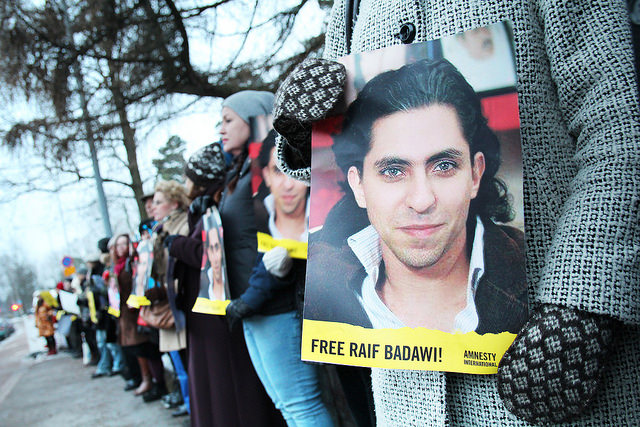Like this article? rabble is reader-supported journalism. Chip in to keep stories like these coming.
Following the recent revelations that the Liberal government will not cancel a $15-billion arms deal with Saudi Arabia, human rights activists have another reason to be concerned with Liberal foreign policy rhetoric translating into policy.
It’s been over a year since Saudi blogger Raif Badawi was publically flogged on the streets of Jeddah 50 times — a portion of his much larger sentence of 1,000 lashes and 10 years of incarceration. These lashes came as part of a sentence that was handed down on Badawi for the crime of running a website encouraging his fellow Saudis to openly talk to one another about reform in their country.
In January 2015, Amnesty International and a group of Canadian MPs and Senators, which included many Liberals, called for Badawi’s release. However, the Harper government did little to intervene.
Now, despite a change in Canada’s government, for many of Badawi’s legions of supporters very little has changed in the last few months that would inspire hope.
To date there have been no further lashings carried out, but Badawi continues to remain without his freedom.
Trudeau refuses to intervene in Badawi case
Badawi’s wife, Ensaf Haidir and his family were granted refugee status in 2013 inexorably linking Badawi’s case with Canadian foreign policy.
Badawi’s supporters might feel the new Liberal government would assist their efforts because of the heavy-handed demands of the Liberal MPs when they were in opposition before last October’s election.
On January 16 of 2015, then Foreign Affairs critic Marc Garneau issued a statement calling on the Canadian government to intensify its efforts to secure Badawi’s release.
In March, Garneau issued another statement in which he called upon the new Minister of Foreign Affairs “to demand in the most forceful manner that His Majesty King Salman pardon Raif Badawi, and allow him to return to Canada so that he may be reunited with his family.”
Following these statements one might be lead to believe that a Liberal government’s approach to Badawi’s case would be markedly different from their Conservative predecessors whom they were criticizing for inaction.
In Dec. 2015, current Liberal Minister of Foreign Affairs Stephan Dion did raise Badawi’s case with his Saudi counterparts and a spokesperson for Dion said the minister would continue to do so. Such early maneuvers may have left human rights activists feeling relieved that a new path was being charted by the Canadian Government.
However, since Dion’s conversation with the Saudi Foreign Affairs official, it would be hard to argue the Liberal Government has issued demands that would be considered “in the most forceful manner” to secure Badawi’s freedom.
Prime Minister Trudeau, who met personally with Ensaf Haidir, has refused to personally intervene in the matter, choosing to leave it in the hands of Dion.
This refusal draws some questions because in January 2015 Dion asked Prime Minister Harper if he would intervene directly with the King of Saudi Arabia, as requested by Haidir — something Trudeau is refusing to do.
A departmental spokesperson for Global Affairs Canada stated that “Canada is following the situation closely and will continue to express our deep concern over Mr. Badawi’s situation both publically and privately, and will continue to call for clemency to be granted in his case.”
Canada needs to be a real human rights leader
The Canadian government has also refused to grant Badawi a Canadian passport, arguing that it would not help secure his freedom. Though Amnesty International has not explicitly called for the Trudeau government to issue Badawi a passport, they did release a statement highlighting Haidir’s request for such a maneuver.
In a statement Amnesty’s Secretary General Alex Neve said “Raif Badawi should be in Canada with his family. Amnesty International continues to urge the Canadian government to explore all possible strategies for securing Mr. Badawi’s immediate and unconditional release. A grant of citizenship, further to his wife Ensaf Haidar’s request, could boost the effectiveness of Canada’s efforts on his behalf.”
Further, Amnesty pressed that Canada could show true leadership in this case further arguing that as long as Badawi remains in prison he is at risk of further ill-treatment.
In early Dec. 2015, Haidar stated Badawi had started a hunger strike after being transfered to a new prison. By the end of the month, Haidar stated Badawi was in poor health and his condition was deteriorating. Amnesty International in Canada was not able to confirm the hunger strike, but remained very concerned for his health.
With such impassioned pleas coming from the Liberal party prior to their electoral success and such early hopes of high prioritization of Badawi’s case one is left wondering when the Liberal government will commit to such actions.
To date, they have yet to publically take any actions that go beyond what their former counterparts in the Ministry of Foreign Affairs had done — the same actions they roundly criticized them for shortly before the election.
Despite being five months into the mandate for “real change” there has been little extra effort put into Badawi’s case beyond what was being done previously and certainly nothing that resembles the increased pressure that Garneau called for in his March statement. All the while Badawi remains at risk requiring a renewed commitment to his cause.
Sign a petition to free Raif Badawi
Ryan Donnelly is a graduate of McMaster’s Public Policy program and has been an organizer in various human rights groups in Ontario where he currently resides.
Photo: flickr/ Amnesty Finland



